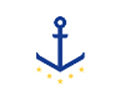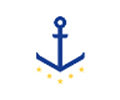

The Central Commission for the Navigation of the Rhine (CCNR) has recommended that Future Proof Shipping’s (FPS) motor cargo vessel “Maas” receives an exemption from the Rhine Vessel Inspection Regulations (RVIR), permitting the use of hydrogen as a fuel for propulsion and power supply on board the vessel.
Another key milestone has been achieved along FPS’s journey toward zero-emissions shipping. Having completed a detailed Hazard Identification (HAZID) study with their classification society Lloyd’s Register (LR), the CCNR recommendation was the next target on FPS’s radar. In mid-June, the good news was shared with a jubilant FPS team.
The recommendation
The recommendation states that the use of hydrogen as a fuel on board the Maas is considered to be sufficiently safe if a number of critical conditions such as risk assessments, crew training, bunkering and data recording, are met at all times.
“This landmark exemption will hopefully act as a catalyst to speed up the approval process and establish concrete rules dedicated to hydrogen fuelled vessels, and ultimately clear the path to zero-emission shipping for all who are prepared to make the transition.” Richard Klatten, CEO – Future Proof Shipping.
FPS can now move ahead with the advanced engineering plans for the “Maas” and soon they will be ready to submit documentation for the final stage of class approval from LR.
The road to recommendation
To receive a recommendation from the CCNR, first a risk analysis and design optimisation study must be completed, with the help of a classification society. The FPS team has been working closely with Lloyd’s Register and the Dutch Ministry of Infrastructure who filed the application for the recommendation with the CCNR, on behalf of FPS.
“My congratulations to FPS with the achievement of this milestone. It is impressive to see that a private company has taken this step in the greening of the inland waterway fleet, and as classification society we are proud to have been chosen to contribute. I believe this recommendation will surely help in the further development of requirements for the use of alternative fuels, and I expect that for future projects it will be easier to get the required recommendations.”
-Bas Joormann, WEA Inland Waterway Product Manager – Lloyd’s Register EMEA.
In the absence of specific rules for the design approval of hydrogen fuelled vessels, the “alternative design process”, by which the safety, reliability and dependability of the systems must be demonstrated to be equivalent to that achieved with comparable conventional systems, is currently the only means of approval for hydrogen vessels.
“The development of techniques for alternative means of propulsion and energy carriers, such as hydrogen and batteries, fits within the ambitions in the Green Deal on Maritime and Inland Shipping and Ports to make inland shipping more sustainable. The Dutch Ministry of Infrastructure & Watermanagement is looking forward to the experiences that will be gained with the application of hydrogen.”
-Annelies van Dijk-Volker, Ministry of Infrastructure & Watermanagement – Dutch Representative in CCNR.
Once the retrofit of the Maas is completed later this year, the vessel will continue to ship container cargo between Rotterdam and Antwerp and is expected to reduce greenhouse gas emissions by 2000 CO2e tonnes annually.
Funding support
This innovative project is supported by funding from the Dutch RVO (Subsidie Duurzaam Scheepvaart scheme), Interreg North Sea Program (via the ZEM Ports NS project) and a stimulation scheme for sustainable inland shipping from the Port of Rotterdam, which is executed by the Expertise en InnovatieCentrum Binnenvaart (EICB).
Future Proof Shipping (FPS) (www.futureproofshipping.com), offers zero-emissions shipping services to enable players across the value chain make the transition to zero-emissions. As a zero-emissions vessel owner, FPS aims to build and operate a fleet of 10 zero-emission inland and short-sea vessels over the next five years which they will offer for charter to logistics service providers and cargo owners. FPS also facilitates other shipowners and stakeholders in the maritime sector who are ready to make the shift to zero-emissions, through technical, financial, and commercial support as well as project development and management.
Source: The Central Commission for the Navigation of the Rhine (CCNR)